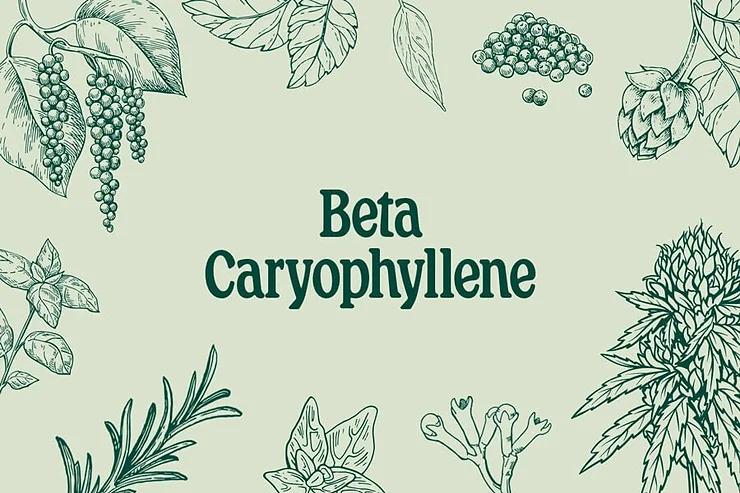Unveiling Beta-Caryophyllene: Nature’s Hidden Wellness Ally
Beta-Caryophyllene, often abbreviated as BCP, is a fascinating natural compound that’s gaining increasing recognition in the wellness and scientific communities. Whether you're familiar with terpenes or just beginning to explore the benefits of plant-based health solutions, BCP is a standout ingredient you should know about. Found in a variety of common herbs and spices, BCP not only contributes to flavor and aroma but also holds remarkable therapeutic potential.
One of the unique aspects of beta-caryophyllene is its interaction with the body’s endocannabinoid system, or ECS. Unlike most terpenes, BCP has the ability to bind directly to CB2 receptors, which are involved in regulating inflammation, immune responses, and pain perception. This connection to the ECS makes BCP a significant player in natural health and wellness.
Learn more how BCP is naturally present in many household spices and herbs, including black pepper, cloves, basil, oregano, and rosemary:
https://odalizer.com/discover-natural-sources-and-health-benefits-of-beta-caryophyllene/
. It is also a key compound found in essential oils like copaiba and clove oil. Beyond the kitchen and aromatherapy, BCP is prominent in certain cannabis strains, contributing to their distinctive peppery, earthy scent and enhancing their therapeutic effects.
The health benefits of beta-caryophyllene are diverse and supported by emerging research. BCP has shown promising results in managing chronic pain, reducing inflammation, easing anxiety, and supporting better sleep. Additionally, recent studies have pointed to its potential role in managing diabetes. By influencing glucose metabolism and improving insulin sensitivity, BCP may help regulate blood sugar levels—an exciting area of ongoing research.
To make BCP available for use in wellness products, several extraction methods are employed. These include steam distillation, supercritical CO2 extraction, solvent extraction, and cold press techniques. The goal of each method is to preserve the compound’s integrity and therapeutic potential. As with any natural extract, purity and quality are essential to ensure safety and effectiveness, especially when used for medicinal or therapeutic purposes.
Beta-caryophyllene represents a powerful intersection of nature and science. Its presence in everyday ingredients and its broad range of health benefits make it one of the most accessible and versatile terpenes available today. Whether you’re consuming it through food, using it in essential oils, or exploring its benefits in cannabis products, BCP offers a natural way to support your wellness journey. As interest in plant-based health continues to grow, BCP is poised to play a central role in the future of holistic and integrative medicine.
#BetaCaryophyllene #BCP #NaturalHealth #Terpenes #PlantMedicine #HolisticHealing #AntiInflammatory #WellnessJourney #EssentialOils #CannabisScience #FunctionalHerbs #ChronicPain #NaturalWellness
Beta-Caryophyllene, often abbreviated as BCP, is a fascinating natural compound that’s gaining increasing recognition in the wellness and scientific communities. Whether you're familiar with terpenes or just beginning to explore the benefits of plant-based health solutions, BCP is a standout ingredient you should know about. Found in a variety of common herbs and spices, BCP not only contributes to flavor and aroma but also holds remarkable therapeutic potential.
One of the unique aspects of beta-caryophyllene is its interaction with the body’s endocannabinoid system, or ECS. Unlike most terpenes, BCP has the ability to bind directly to CB2 receptors, which are involved in regulating inflammation, immune responses, and pain perception. This connection to the ECS makes BCP a significant player in natural health and wellness.
Learn more how BCP is naturally present in many household spices and herbs, including black pepper, cloves, basil, oregano, and rosemary:
https://odalizer.com/discover-natural-sources-and-health-benefits-of-beta-caryophyllene/
. It is also a key compound found in essential oils like copaiba and clove oil. Beyond the kitchen and aromatherapy, BCP is prominent in certain cannabis strains, contributing to their distinctive peppery, earthy scent and enhancing their therapeutic effects.
The health benefits of beta-caryophyllene are diverse and supported by emerging research. BCP has shown promising results in managing chronic pain, reducing inflammation, easing anxiety, and supporting better sleep. Additionally, recent studies have pointed to its potential role in managing diabetes. By influencing glucose metabolism and improving insulin sensitivity, BCP may help regulate blood sugar levels—an exciting area of ongoing research.
To make BCP available for use in wellness products, several extraction methods are employed. These include steam distillation, supercritical CO2 extraction, solvent extraction, and cold press techniques. The goal of each method is to preserve the compound’s integrity and therapeutic potential. As with any natural extract, purity and quality are essential to ensure safety and effectiveness, especially when used for medicinal or therapeutic purposes.
Beta-caryophyllene represents a powerful intersection of nature and science. Its presence in everyday ingredients and its broad range of health benefits make it one of the most accessible and versatile terpenes available today. Whether you’re consuming it through food, using it in essential oils, or exploring its benefits in cannabis products, BCP offers a natural way to support your wellness journey. As interest in plant-based health continues to grow, BCP is poised to play a central role in the future of holistic and integrative medicine.
#BetaCaryophyllene #BCP #NaturalHealth #Terpenes #PlantMedicine #HolisticHealing #AntiInflammatory #WellnessJourney #EssentialOils #CannabisScience #FunctionalHerbs #ChronicPain #NaturalWellness
Unveiling Beta-Caryophyllene: Nature’s Hidden Wellness Ally
Beta-Caryophyllene, often abbreviated as BCP, is a fascinating natural compound that’s gaining increasing recognition in the wellness and scientific communities. Whether you're familiar with terpenes or just beginning to explore the benefits of plant-based health solutions, BCP is a standout ingredient you should know about. Found in a variety of common herbs and spices, BCP not only contributes to flavor and aroma but also holds remarkable therapeutic potential.
One of the unique aspects of beta-caryophyllene is its interaction with the body’s endocannabinoid system, or ECS. Unlike most terpenes, BCP has the ability to bind directly to CB2 receptors, which are involved in regulating inflammation, immune responses, and pain perception. This connection to the ECS makes BCP a significant player in natural health and wellness.
Learn more how BCP is naturally present in many household spices and herbs, including black pepper, cloves, basil, oregano, and rosemary:
https://odalizer.com/discover-natural-sources-and-health-benefits-of-beta-caryophyllene/
. It is also a key compound found in essential oils like copaiba and clove oil. Beyond the kitchen and aromatherapy, BCP is prominent in certain cannabis strains, contributing to their distinctive peppery, earthy scent and enhancing their therapeutic effects.
The health benefits of beta-caryophyllene are diverse and supported by emerging research. BCP has shown promising results in managing chronic pain, reducing inflammation, easing anxiety, and supporting better sleep. Additionally, recent studies have pointed to its potential role in managing diabetes. By influencing glucose metabolism and improving insulin sensitivity, BCP may help regulate blood sugar levels—an exciting area of ongoing research.
To make BCP available for use in wellness products, several extraction methods are employed. These include steam distillation, supercritical CO2 extraction, solvent extraction, and cold press techniques. The goal of each method is to preserve the compound’s integrity and therapeutic potential. As with any natural extract, purity and quality are essential to ensure safety and effectiveness, especially when used for medicinal or therapeutic purposes.
Beta-caryophyllene represents a powerful intersection of nature and science. Its presence in everyday ingredients and its broad range of health benefits make it one of the most accessible and versatile terpenes available today. Whether you’re consuming it through food, using it in essential oils, or exploring its benefits in cannabis products, BCP offers a natural way to support your wellness journey. As interest in plant-based health continues to grow, BCP is poised to play a central role in the future of holistic and integrative medicine.
#BetaCaryophyllene #BCP #NaturalHealth #Terpenes #PlantMedicine #HolisticHealing #AntiInflammatory #WellnessJourney #EssentialOils #CannabisScience #FunctionalHerbs #ChronicPain #NaturalWellness
0 Comments
0 Shares


